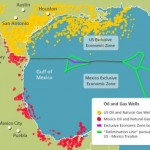Shipments to Mexico and Canada account for nearly 50% of Texas exports
EnerCom Dallas conference features a trade expert speaking on NAFTA
The nation’s largest state independent oil and gas association has come out in favor of keeping the North American Free Trade Agreement (NAFTA) in place.
The Texas Alliance of Energy Producers, its board representing more than 3,300 independent oil and gas members, delivered its formal support after President Donald Trump said he may terminate the agreement and begin the negotiations anew in remarks during the World Economic Forum in Switzerland.
In anticipation of possible changes to the trade agreement, the group along with consultants cited NAFTA’s influence on Texas independent oil and gas production:
Mexico, Canada and Texas
- Natural gas exports to Mexico have increased by well over five times (445%) since 2010, including an estimated 30% in 2017 alone;
- The U.S. became a net exporter of natural gas in North America by year end 2017 due in large part to rapidly expanding natural gas exports to Mexico;
- Exports of crude oil to Mexico have increased by some 320% since 2010;
- Exports from Texas account for 16% of all U.S. exports; and
- Shipments to Mexico and Canada account for nearly 50% of Texas exports.
The group said that imports from Canada have displaced significant amounts crude oil imports from OPEC and other more volatile suppliers.
“The heavier grades of crude oil imported to the U.S. from Canada are a necessary part of the U.S. oil supply mix,” said Alliance President John Tintera. “Many U.S. refineries were built to handle those grades, and require heavy crude to make several vital consumer products.”
The group said in a statement it will continue working with government officials to ensure that if renegotiated, NAFTA will:
- Retain a low/zero tariff trade structure in a way that continues to foster the expansion of unfettered energy trade and investment between the United States, Canada, and Mexico;
- Be enacted with no sunset provision;
- Retain its current form if an agreement cannot be reached as a result of the current negotiations.
Calling NAFTA “an energy economics success story by virtually every measure,” Ingham said the agreement “has contributed to growth and jobs in the Texas and US oil and gas industry, it is providing new markets for domestic energy production, and is lowering the costs to consumers in all three countries.”
NAFTA then and now
According to the Office of the United States Trade Representative (USTR), after the U.S. and Canada established in the U.S.-Canada Free Trade Agreement in 1989, Canada joined U.S. and Mexico’s bilateral trade talks which resulted in NAFTA on January 1, 1994. Tariffs were eliminated progressively and all duties and quantitative restrictions, with the exception of some agricultural products traded with Canada, were eliminated by 2008.
On May 18, 2017, following consultations with congressional committees, U.S. Trade Representative Robert Lighthizer informed Congress that the president intends to commence negotiations with Canada and Mexico with respect to the NAFTA.
The USTR said in hearings from June 27-29, 2017, the office heard directly from over 140 witnesses who represented industries, workers, farmers and ranchers. Transcripts for those hearings are here.
Negotiations for a ‘new NAFTA’ are tough
The conversation between the governments of the three countries has been difficult, with all the three of the parties to the negotiations issuing strong statements.
On January 10, Reuters reported that Mexico said it would leave the NAFTA negotiating table if U.S. President Donald Trump decides to trigger a six-month process to withdraw from the trade pact. Reuters said it had spoken to three Mexican sources with knowledge of the talks.
“I think it’s indisputable that if Trump announces a U.S. withdrawal from NAFTA, well at that moment the negotiations stop,” said Raul Urteaga, head of international trade for Mexico’s agriculture ministry.
A NAFTA termination letter would start the six-month exit clock ticking, Reuters said, but that the United States would not be legally bound to quit NAFTA once it expires. “Washington could use the move as the ultimate sleight of hand as it seeks to gain leverage over Canada and Mexico in talks to update the 24-year-old trade pact,” Reuters said.
ON Jan. 29, CBC reported that trade ministers from Canada, Mexico and the United States wrapped up the sixth round of NAFTA negotiations acknowledging tough challenges still lie ahead to strike a new deal. U.S. Trade Representative Robert Lighthizer said while some progress was made, he hopes it will accelerate and achieve “major breakthroughs,” CBC reported, saying trilateral negotiations are more “complicated and contentious” than bilateral talks.
CBC said that in his closing remarks, Lighthizer also took the opportunity to rip into a trade challenge launched by Canada against the U.S., calling the World Trade Organization filing against Washington’s use of anti-dumping and anti-subsidy duties “unprecedented” and a “massive attack on all of our trade laws.”
On Feb. 2, Bloomberg reported Canada Prime Minister Justin Trudeau said, “We aren’t going to take any old deal. Canada is willing to walk away from NAFTA if the United States proposes a bad deal. We won’t be pushed around.”
EnerCom Dallas features a North American trade expert discussing NAFTA
Getting past the political discussions surrounding NAFTA renegotiations, at the upcoming EnerCom Dallas investment conference, which is Feb. 21-22, 2018, Mr. Delon Chan, Canadian Consulate, and a North American trade expert, will give a data-based presentation about the effects of NAFTA on the oil and gas industry in both the U.S. and Canada, the importance of NAFTA to the U.S. – Canada oil and gas sector, and potential implications on U.S.-Canada Oil and gas trade and investment without NAFTA.
EnerCom Dallas will be held at the Tower Club, Downtown Dallas, Feb. 21-22, 2018. Registration is open online to oil and gas industry executives and institutional investors who wish to attend the conference.







